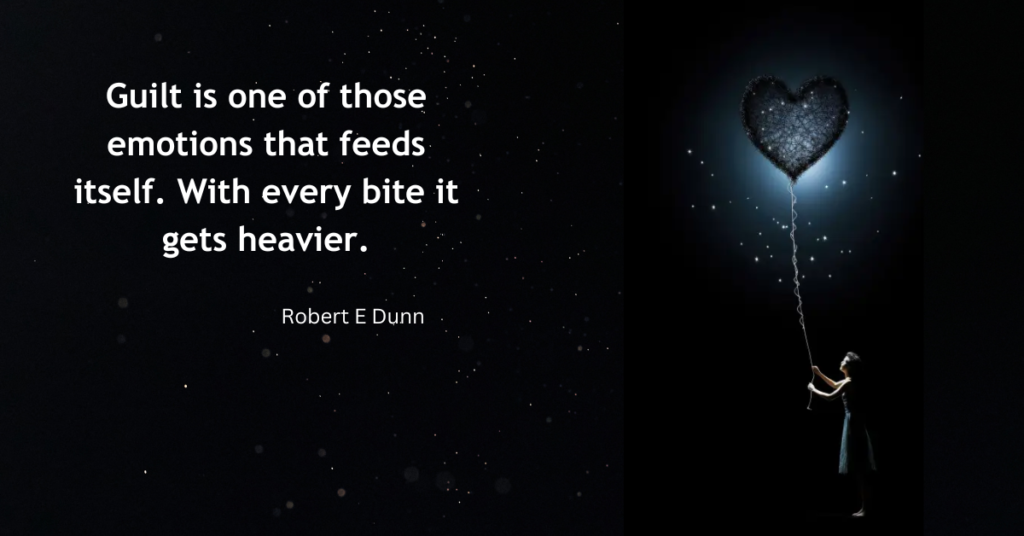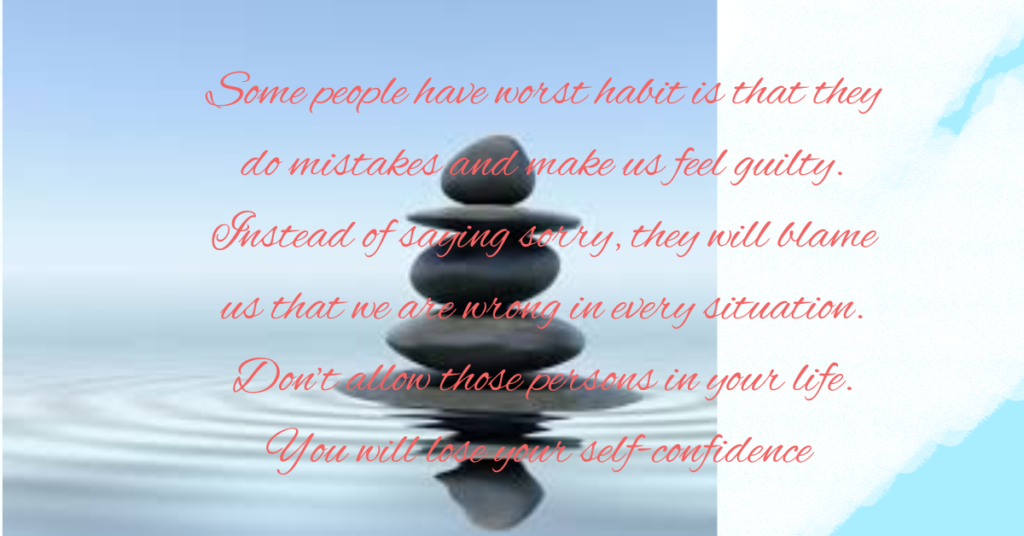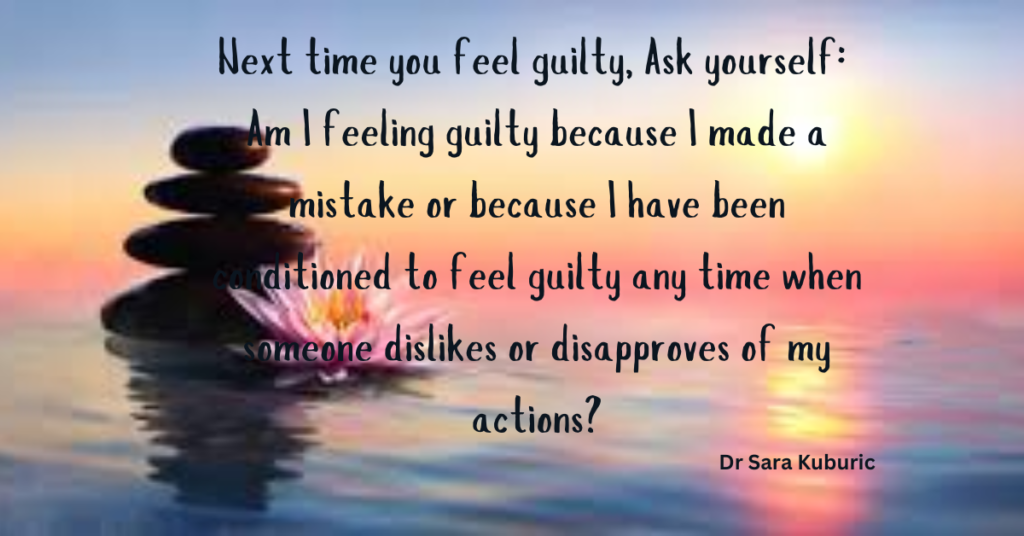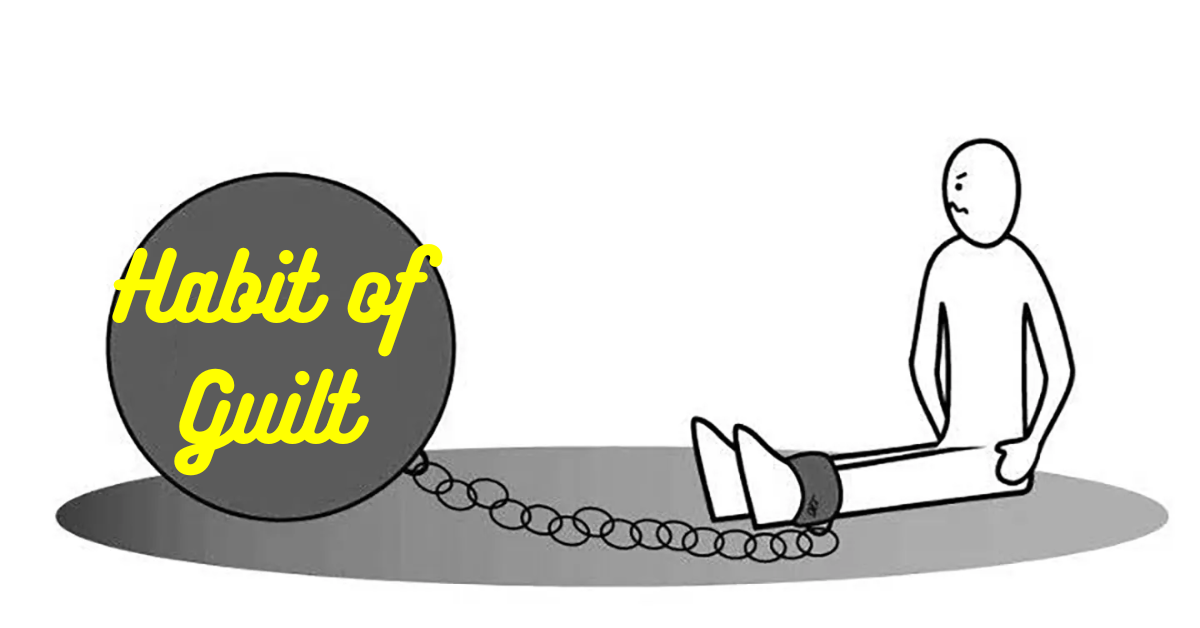Table of Contents
Carrying guilt is like living with a constant shadow; it dims the light of your true potential and clouds the clarity of your purpose.
We human beings are prone to guilt. Imagine this, carrying guilt like walking with a shadow that will never leave your side. Guilt dims your inner light and holds you back from seeing the right path of your purpose.
Deconstructing Guilt and Overcoming the Habit
Guilt is like on of those silent yet burdening emotions that follows us everywhere. It tells us how to think, what kind of choices to make and even how we relate to ourselves. It drives everything from our thoughts to choices to relationships. It is an impostor hiding beneath the surface and in controls our days in ways we don’t even realize. This blog is an exposure to that silent enemy often misunderstood weight of guilt. Why does it cling us, the impact it leaves on our lives, and most importantly, how can we liberate ourselves from it.
The core purpose of this blog is to shed some light on this emotion called guilt. Where does it originate from and how does it emerge in our lives. Guilt stems from many sources; it could be cultural conditioning, family customs and traditions, or the high bar we set for ourselves. When we uncover these roots, we recognize and comprehend out patterns of guilt. This is the first step towards releasing the guilt and reclaiming peaceful life we deserve.

Deconstructing guilt means learning to see its many facets. There are people who experience situational guilt, the kind of which get triggered from a specific event or mistake. Most of us carry chronic guilt. A relentless, persistent sense of doing wrong, it includes when nothing specific has occurred. In this blog, we will learn about different types of guilt so that we comprehend our emotional landscape and commence the process of healing.
Let’s not just limit ourselves to understanding guilt, but this blog is about enabling and evolvement. This blog has practical tools and system to help you release guilt that is stuck up in your mind and heart. With help of self-awareness, self-compassion practices, brain rewiring techniques, you will learn how to identify guilt-driven thoughts and, challenge its credibility, and swap them with healthier and more supportive beliefs. The intention here is to move ahead from self-blaming to self-realization. A journey from self-misery to inner freedom.
Besides this, blog also emphasizes on the groundbreaking power of forgiveness and tenacity in breaking free from the grip of guilt. We deeply understand that forgiveness is not the process of erasing the past; but it is about releasing the hold it has on your heart. Forgiveness is a gateway to emotional freedom, while resilience safeguards that guilt do not find its way back to your heart.
Basically, treat this blog as an invite to heal, grow and reclaim your power. The goal is to provide not just perceptions but real pathways to evolvement. Helping you to deeply understand the root causes of guilt, destruct its patterns, and grow beyond it. The ideas in this blog will help you create a secured and nurturing environment which will help you step out of the shadow of guilt and walk with poise, confidence, grace and dignity towards a lighter, more content life.
Deconstructing Guilt
Guilt is a deeply intricate layered emotion. It rises its head when we think we have let ourselves down or fallen short of expectations of others or on our values. It is an ambivalent state where we feel remorse, responsibility and the need to make things right immediately. In a healthier domain, guilt acts a moral compass aligning us towards our values, guiding us to introspection, growth and harmony. But the when feel it as a nagging feeling for a longer time, leaving you emotionally burdened, that is the time your guilt has stopped being a teacher and becomes an enemy. It drains your energy, undermining our confidence, confining us in the past.
Comprehending the dual nature of guilt is the first step you take to reclaiming your life. Learning to honour its lessons without letting it define us.

Definition
Guilt emanates when we hold ourselves responsible for a misconduct, does not matter if it actually happened or it is just perceived by us. It is important to separate guilt from shame, another poignant emotion. While in guilt the focus is on a specific action (I did something wrong), shame targets the self (I am wrong). Fundamentally, guilt has its focus on a person’s behaviour and its repercussions, whereas shame assaults on one’s self-esteem, often leading to feelings of not good enough and unworthiness.
Guilt is fundamentally about feeling responsible for a wrongdoing, whether real or perceived. It is important to differentiate guilt from shame, another powerful emotion. While deconstructing guilt is associated with a specific action (“I did something bad”), shame is more about self-identity (“I am bad”). Deconstructing Guilt focuses on behavior and its consequences, whereas shame attacks the core of one’s self-worth, leading to feelings of inadequacy and unworthiness.
Types of Guilt
There are several types of guilt that people may experience:
- Situational Guilt: This guilt germinates from an explicit event or a blunder that is caused by you. It could be like lying, or not showing up as promised or you emotionally hurt someone. It is usually linked to a clear, recognizable incidents and can be addressed through a genuine apology, self-contemplation or corrective action.
- Chronic Guilt: Distinct to situational guilt, which occurs from an explicit event or a fault, chronic guilt is a persistent, nagging feeling that does not have a reason. It stems from an ongoing feeling of not adequate or from perfectionism where the expectations aren’t realistic.
- Survivor’s Guilt: This guilt shows up when an individual feels regret or responsible for enduring a distressing event while others with them did not. Survivors who go through accident, natural disasters, or military combat, it leaves the person often examining one’s right to live, or be happy. This kind of guilt is highly disturbing and needs compassionate healing and emotional support to conquer the guilt.
Causes
Guilt can be activated by various factors, including:
- Cultural and Social Norms: Societal expectancy and cultural values shape our sense of right and wrong. When we act or behave that do not match the accepted norms, it activates the feelings of guilt. This is also when our actions are true and harmless.
- Family Dynamics: Childhood experiences play a significant role in how we distinguish guilt. When you are grown up in environment with lot of criticism, comparison, and high expectations, it creates an internal belief that to be loved or worthy of approval you need to meet the set expectations.
- Personal Beliefs and Standards: People who are dependent on their perfectionist tendencies or set up high benchmarks of expectations are particularly inclined to to guilt. Even the smallest mistake or unmet goals make them feel like personal failures which fuels the vicious cycle of self-criticism and emotional pain.
The first step of breaking the mental prison of guilt is to know where it originates from and the versions it shows up in your life. The grip loosens when you start to distinguish different forms of guilt and the roots that feed it. This knowledge lets you to confront your emotions with kindness, take the needed lessons and slowly head for greater peace, self-acceptance, and emotional resilience.
The Impact of Guilt
Guilt is an emotion that can significantly affect various aspects of our lives. When guilt becomes a habitual response, its impact can extend beyond fleeting discomfort, leading to profound emotional, physical, and behavioral consequences

Emotional Effects
Guilt has the power to take a deep emotional strain when it stays for too long. It just does not stay in the mind, it makes its place in your heart, creating rollers of anxiety sadness and self-doubt. Eventually, the burden of guilt leaves you trapped in a painful cycle: guilt drives worry and misery, which then increases even more guilt. This unending loop leaves you exhausted and isolated. It slowly drains your self-worth, self-belief, and robs your joy. Breaking free from this trap needs you to be courageous, compassionate and conscious.
Physical Effects
Guilt does not only impact your mind; it takes a toll on your body as well. When guilt lives with you for a longer time, it shows up as fatigue, headaches or even stomach problems. The endless self-criticism deteriorates your immune system, leaving the body more exposed to sickness. People who live with guilt find it difficult to sleep, as their mind echoes regrets and “what-ifs scenarios”. Eventually, this combination of emotional strain and physical exhaustion creates a cycle of tiredness that feel impossible to break.
Behavioral Consequences
Guilt has a commanding influence on the choices you make. When you live with guilt all the time, you avoid socializing or circumstances that becomes a reminder of your mistakes, missing out on opportunities of growth and new experiences. However, some people compensate guilt by behaving to the opposite extreme overgenerous, overcommitted, or relentless pursuit of perfection. While they intend to do good but this constant chase and need to be perfect leave them exhausted, resented and strained relationships. In both scenarios, guilt plays a major role in shaping life from shadows, keeping you living an authentic and free life.
Guilt is a profound emotion having the power of impacting all aspects of life. Deciding from how you think, feel, and behave. It goes beyond the bounds of mind, manipulating our bodies, our choices, and even our relationships. The key to freedom from this enemy called guilt lies in consciousness. When we observe how guilt manifests be it emotionally, physically or in your behavior you have the power to heal yourself. With right practices and kindness, it is possible to fight and release guilt’s clutches and move towards a happy, peaceful and emotionally balanced life.
The Cycle of Guilt
Guilt can become a habitual response, creating a cycle that perpetuates negative emotions and behaviors. Understanding this cycle is crucial for breaking free from its grip and achieving emotional well-being.
Identification:
Recognizing patterns of guilt is the beginning of your healing journey. It is all about knowing the trigger point of how and when guilt shows up in your life. It can be a tough day, or a disagreement with a colleague, or someone you care about, or when you let yourself down and do not fulfil the set expectations. These situations often reveal deeper patterns. By gently observing your responses and introspecting on the same. You can use journaling as a tool and begin to reveal the frequent situations that trigger guilt. This method is a powerful way to transforming how guilt affects you.
Analysis:
Identification of your guilt triggers is the first step; the next depth is to look scrutinize your thought patterns and belief system that keep the guilt thriving. Mostly guilt births from impractical expectations like believing you have to be perfect or your mistakes defining your worth etc. These harsh internal expectations from self leaves you with low self-worth and low self-belief.
It is so important to confront your thought patterns and question them. Questions like, “Is this belief really true?” “Would I say this to someone I care about?” Transforming your outlook will release your guilt trip. Tools from cognitive-behavioral therapy (CBT) are powerful ones which help you identify negative thought patterns and gently replace them with a balanced, kinder ones. As you practice this your guilt transforms into self-compassion and emotional resilience.
Examples:
Lets look at some real-life examples which brings the cycle of guilt in sharper focus.
For example, Sarah is a working professional and a dedicated mother who loves her children but is often a victim of guilt battling for not spending enough time with her children. Every time when she stays back at work, or has a travel for work, a pang of guilt consumes her, feeding self-criticism and anxiousness. To compensate over this guilt, she works hard tirelessly to be a “perfect mom” at home. Planning adventurous activities, overstretching herself, neglecting self-care and rest. After so much of hard work when she inevitably feels exhausted the guilt shows up even stronger than before, deceiving her in exhausting loop.
The other example is John, who is guilty of some past mistake in his relationship. He mentally rehearses repeatedly in his mind, questioning himself how he could have better or differently handled the situation. This mental replay keeps his guilt alive and thriving. His guilt stops him to open up to new relationships. Instead of learning from his past mistakes and taking corrective actions and moving forward, he is anchored to the past mistake burdened by regret.
Both the examples confirm how guilt plays a major role in shaping your choices and energy, turning genuine care into fatigue unless you consciously choose to release it.
When you recognize the triggers and learn to dissect your thought patterns, and taking lessons from real life examples, you have the power to break the cycle of guilt. This course of action demands patience and self-compassion which is very important for achieving emotional resilience, regulation and a healthier mindset.
Strategies to Overcome Guilt
Guilt, while sometimes useful for moral and ethical development, can often become a crippling emotion when it is chronic or excessive. Overcoming guilt involves adopting practical strategies that promote emotional well-being and healthier thought patterns
Self-Awareness:
Self-awareness is the answer to overcoming guilt. The primary step to be taken to achieve freedom. It is about stopping and noticing when that known heaviness of guilt envelopes you and asking the question at the right time, why? What triggered that guilt? What is the story you are entertaining yourself with in that moment?
Journaling is an effective way to cultivate awareness. Writing down incidents and moments when you feel guilty, along with the thought patterns, emotions, and conditions surrounding them. You start to recognize your recurring patterns. Probably it is connected to perfectionism, or unmet expectations, or a fear of letting the other person down. Awareness is a simple habit of that helps you change from overwhelmed guilt to witnessing it with clarity. Once you know the root cause of how it generates you have the power to respond consciously rather than react automatically..
Self-Compassion:
Another power key to eliminate guilt is cultivating self-compassion. A powerful way to soften the tight grip of guilt on you. Most of the times, we want to reach at such impractical standards and speak so harshly with ourselves, we would never speak to someone whom we love. True healing starts when you project the same kindness and gentleness towards yourself.
When guilt shows up, pause and gently change the inner dialogue to, “I am human, mistakes don’t define me, they teach me”. Treating yourself with the same gentleness and love you would offer a close friend in pain is magical. Self-compassion derives from self-forgiveness. Admitting what happened, taking responsibility when needed, learn your lessons, and then let it go. You need to carry the burden of guilt forever. Mindfulness meditation nurtures compassion and kindness. When you sit in silence it helps you observe your thoughts, emotions without judgment and respond with empathy rather than criticism. Self-compassion is a safe space within you which allows guilt to dissolve and love to take roots.
Cognitive Restructuring:
Cognitive restructuring is changing the way you distinguish and respond to your thoughts that triggers your guilt. The process is simple, it asks you to pause, question and then gently reconstruct the story you are telling yourself. What is your self-talk when guilt shows up? Notice that. Are you being brutal to yourself or wanting to meet impossible higher standards?
For example, instead of having a conversation, “I failed, so I am not capable”, change it to, “I made a mistake, this is how I learn and grow”. Reframing it simply makes a huge difference. It drastically changes how you feel and respond. Using the CBT technique, the intention is to recognize distorted thought patterns, like perfection or exaggerating and modify it with positive, empowering thoughts.
When you consistently practice CBT technique it helps you restructure your guilt from a source of self-punishment into a stepping stone for self-awareness and personal growth.
Behavioral Changes:
If you are committed to defeat guilt then taking immediate action is important to conquer over guilt. Get in touch with realistic expectation and goals, set them well. Remind yourself it is ok to be imperfect. Embracing a gentle approach towards yourself is necessary, give yourself permission to fail, to rest and recharge through regular self-care.
If you are guilty of something act that has hurt someone else then take responsibility of it and take corrective actions. Behavioural changes start with tiny actions of accountability. It brings in emotional relief and rebuilds your trust. By combining reflection with action, you turn guilt from a heavy burden into an opportunity for growth, connection, and personal integrity.
Seeking Support:
Remember you are not alone in this journey, seek support from your family, friends when you need it. In the journey of change, opening up to a trusted friend, therapist or a mentor marks a huge difference. Opening up your heart and knowing people around have also gone through the same struggles brings deep sense of comfort and relief. You are not the only one in this.
Grip of guilt loosens as you consistently weave these practices in your daily routine. This is not happening overnight; this is a process which will demand patience and compassion for yourself. You will feel small moments of lightness and peace washing over you. These small little steps, will build a strong castle of inner peace and sense of balance, you will start moving forward with confidence, grace and self-trust.
Healing and Moving Forward
Healing from guilt and moving forward requires a deliberate and compassionate approach. Key components of this process include forgiveness, developing healthy coping mechanisms, and building emotional resilience.

Forgiveness:
While you are dealing with guilt, forgiveness is a power tool to overcome it. With forgiveness you learn to release the heavy burden of self-criticism and blame. You open and make room for compassion. Forgiving yourself is touching your humanness, it does not mean justifying your mistakes. It simply means being humans includes moments of imperfection. It is a nice shoutout that you did your best you could with the knowledge you had at that time.
Self-forgiveness is being responsible for your actions, its consequences, pick up lessons for yourself and move ahead without attaching pain endlessly. The same logic goes in forgiving others, it is not about approving their actions, it is about letting go the bitterness from your heart that keeps you connected to the past. When you choose forgiving yourself or others, it is setting yourself free from the mental prison.
Healthy Coping Mechanisms:
Learning to deal with guilt in healthy ways is important for healing. When you practice mindfulness meditation it helps you stay grounded in the now, instead of getting imprisoned in the endless replay of previous mistakes. You grip of guilt loosens when you choose to focus in the now. Taking care of yourself is equally important. Allow yourself to rest, to indulge in activities which makes you happy, and to nurture your body and mind.
Journaling is an activity which is deeply healing, it lets you pour your emotions on the paper, giving them room to be validated and understood. Some people can choose creativity as a pathway to healing like, painting, writing, singing or playing a musical instrument. It helps your express yourself fully and release emotions. The outcome of the healing methods is stop letting guilt define you. It becomes a catalyst that rekindles warmth, compassion and love within you.
Building Resilience:
Focus on building emotional resilience it helps you bounce back and when guilt pulls you down. Cultivate a growth mindset, start reframing your failures as lessons that shape you into someone intelligent. Choose to be surrounded by people who empower and uplift you, those who work as a reminder of your self-worth when you forget it yourself.
Learn to be gentle and set realistic expectations. You alone don’t have to figure everything for yourself and especially you don’t need to be perfect. Meaning of being a human is to commit mistakes, being imperfect and it is absolutely okay. Practice of gratitude is a way to have a powerful shift. It helps you refocus from what went wrong to everything that is perfect and beautiful on your life.
The healing journey does not happen instant; it is a journey. Practices like forgiveness, mindful coping, and embracing resilience, you get out of the grip of guilt and hug your heart. Over time, you rediscover a sense of lightness and balance, opening space for peace, joy, and a deeper connection with yourself.
Conclusion
In conclusion, overcoming the habit of guilt is a journey that requires self-awareness, compassion, and deliberate effort. Guilt, while sometimes a natural response to our actions, can become an overwhelming force that negatively impacts our emotional, physical, and behavioral well-being. By understanding its nature, identifying its triggers, and adopting practical strategies to manage and alleviate it, we can break free from its paralyzing grip.
Throughout this blog, we have explored the multifaceted aspects of guilt, from its definition and types to its profound impact on our lives. We have seen that guilt can stem from various sources, including cultural, familial, and personal beliefs, and can manifest in different forms such as situational, chronic, and survivor’s guilt. Recognizing these different types and their causes is the first step in addressing guilt effectively.
We have delved into the emotional, physical, and behavioral consequences of guilt, highlighting how it can lead to anxiety, depression, and stress-related physical symptoms, as well as influence our decision-making and actions. Understanding these impacts underscores the importance of tackling guilt proactively to improve our overall well-being.
The cycle of guilt can be broken by identifying patterns and triggers, analyzing the thought processes that perpetuate it, and learning from real-life examples. This analytical approach helps demystify guilt and provides a clear path toward overcoming it.
Practical strategies to overcome guilt include developing self-awareness, cultivating self-compassion, practicing cognitive restructuring, and making behavioral changes. These strategies empower us to challenge and change guilt-inducing thoughts and behaviors, promoting healthier and more constructive patterns.
Forgiveness, both of oneself and others, plays a crucial role in healing from guilt. It allows us to release the burden of past mistakes and move forward with a lighter heart. Healthy coping mechanisms and building resilience are also essential, helping us manage guilt in the present and prevent it from overwhelming us in the future.
By embracing these approaches, we can transform guilt from a paralyzing force into an opportunity for growth and self-improvement. It requires patience, practice, and a supportive environment, but the journey toward overcoming guilt is one that leads to greater emotional freedom and a more fulfilling life. As you move forward, remember that progress takes time, and each step you take toward understanding and managing guilt is a step toward a brighter, more balanced future.
Remember, overcoming guilt is a journey, and it’s perfectly normal to encounter setbacks along the way. Each step you take, no matter how small, is progress toward a healthier, more balanced life. Be patient and kind to yourself as you navigate this path.
I encourage you to implement the strategies discussed in this blog. Practice self-awareness, cultivate self-compassion, and challenge guilt-inducing thoughts. Share your experiences and insights in the comments below or with your support network. Your journey can inspire and help others who are also working to overcome the habit of guilt. Together, we can create a community of understanding and support, fostering emotional freedom and well-being for all.
We’d love to hear your thoughts and experiences on overcoming guilt. Have you tried any of the strategies mentioned? What has worked for you, and what challenges have you faced? Please share your stories and insights in the comments section below. Your contributions can provide valuable support and inspiration to others on this journey.
Additional Resources
Recommended Books: For those looking to further their understanding and continue their journey in overcoming guilt, here are some recommended books:
- “Radical Acceptance” by Tara Brach – This book explores how embracing our true selves and our experiences with compassion can lead to emotional freedom.
- “The Gifts of Imperfection” by Brené Brown – Brené Brown delves into how embracing our imperfections and vulnerabilities can help us live a more wholehearted and guilt-free life.
- “Self-Compassion” by Kristin Neff – This book provides practical advice on how to be kinder to ourselves, which is crucial for overcoming guilt.
- “Feeling Good: The New Mood Therapy” by David D. Burns – This classic work on cognitive-behavioral therapy offers techniques to combat negative thinking patterns, including those that contribute to guilt.
- “Forgiveness – How to Make Peace With Your Past and Get on With Your Life” by Sidney B. Simon and Suzanne Simon – This book offers practical advice and exercises to help readers understand and let go of guilt.
RELATED TOPICS:
Spiritual Meaning of Forgiveness: 6 Ways to Heal the Soul
Healing the Soul of a Woman: 7 Awesome Steps for Inner Peace


Pingback: Trusting the Universe: 6 Awesome Ways to Cultivate Trust in Times of Uncertainty - True Potential Quest